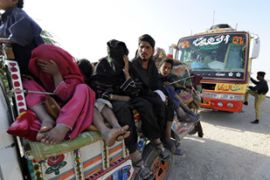Pakistan forces ‘making progress’
Military claims early victories as thousands flee South Waziristan fighting.

Residents flee
“The forces are carrying out a successful operation. And we will complete the operation within the timescale,” Major General Athar Abbas, a Pakistani military spokesman told reporters at a press conference in Islamabad, the capital.
| In depth | |||||||||||||||||
|
His comments were backed up by Qamaruz Zaman Kaira, the country’s information minister, who ruled out any chances of a negotiation now that the offensive had begun.
“For negotiated settlement, there’s only one way,” he said.
“They should surrender their arms before the law-enforcement agencies, they should surrender themselves. And then, if there is any justified need, a justified dialogue and discussion, that can be made but not at this stage.”
The fighting meanwhile has forced thousands of civilians to flee the area, raising fears that the offensive could trigger a refugee crisis.
One refugee, Fazlu Rehman, told the Associated Press, he and his family had little choice but to leave their homes.
“The fighting is going on there. There are lots of bombardments of houses, of mosques, of madrassas [religious schools], of everything,” he said.
“And so we don’t have any choice except to leave the area. We’re going to find some safe place.”
No deal
| Facts: South Waziristan |
|
|
Around 28,000 soldiers have been deployed to battle a Taliban that Islamabad estimates to be about 10,000 strong force, including a thousand Uzbek fighters and some Arab al-Qaeda members.
The army had launched brief offensives in South Waziristan before, the first in 2004 when it suffered heavy casualties before striking a peace deal.
But Pakistan analysts say there was never any chance of a renegotiated peace settlement.
In an interview with Al Jazeera on Monday, Ishtiaq Ahmed, a political analyst, said “the time for deals is over”.
“The security establishment as well as the civilian government are absolutley clear that they will not negotiate with the Pakistan Taliban or its terrorist affiliates across the country”, Ahmed said.
“There are rifts in the Taliban movement and there are people in North Waziristan who have openly condemned terrorist attacks within Pakistan. It seems the government is trying to cultivate their support”, he said.
The latest offensive could be the Pakistan military’s toughest test and the army will be attempting to prevent Taliban factions across the border in Afghanistan from entering the fight.
Schools closed
Security has been stepped up across the country amid fears that the offensive could trigger reprisal attacks against targets in Pakistan’s main cities.
Among measures being taken are the closure of most military schools and colleges across Pakistan for a week.
The decision was announced on Sunday after the Taliban threatened that a school bus may be hijacked, security officials said.
A number of private and government schools were also considering a temporary closure, Pakistani security officials said.
Al Jazeera’s Alan Fisher, reporting from the Pakistani capital, Islamabad, said government officials feared that schools could be targeted by suicide bombers, or that pupils could be taken hostage by those threatening to blow the school up.
“We have no way of confirming whether or not the threats were made by the Taliban, but the threat was enough for the Pakistani government to take this action,” he said.

 The district in the Federally Administered Tribal Area (FATA) borders Afghanistan, North Waziristan, the North-West Frontier Province and Balochistan
The district in the Federally Administered Tribal Area (FATA) borders Afghanistan, North Waziristan, the North-West Frontier Province and Balochistan